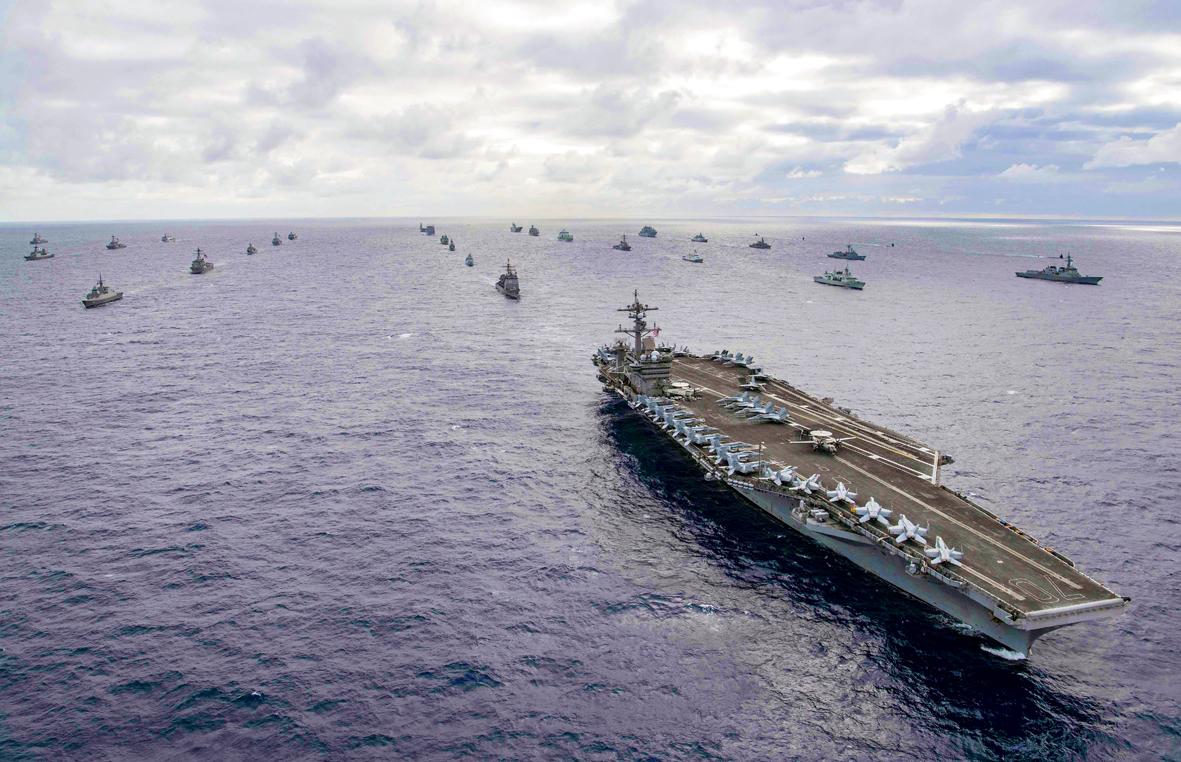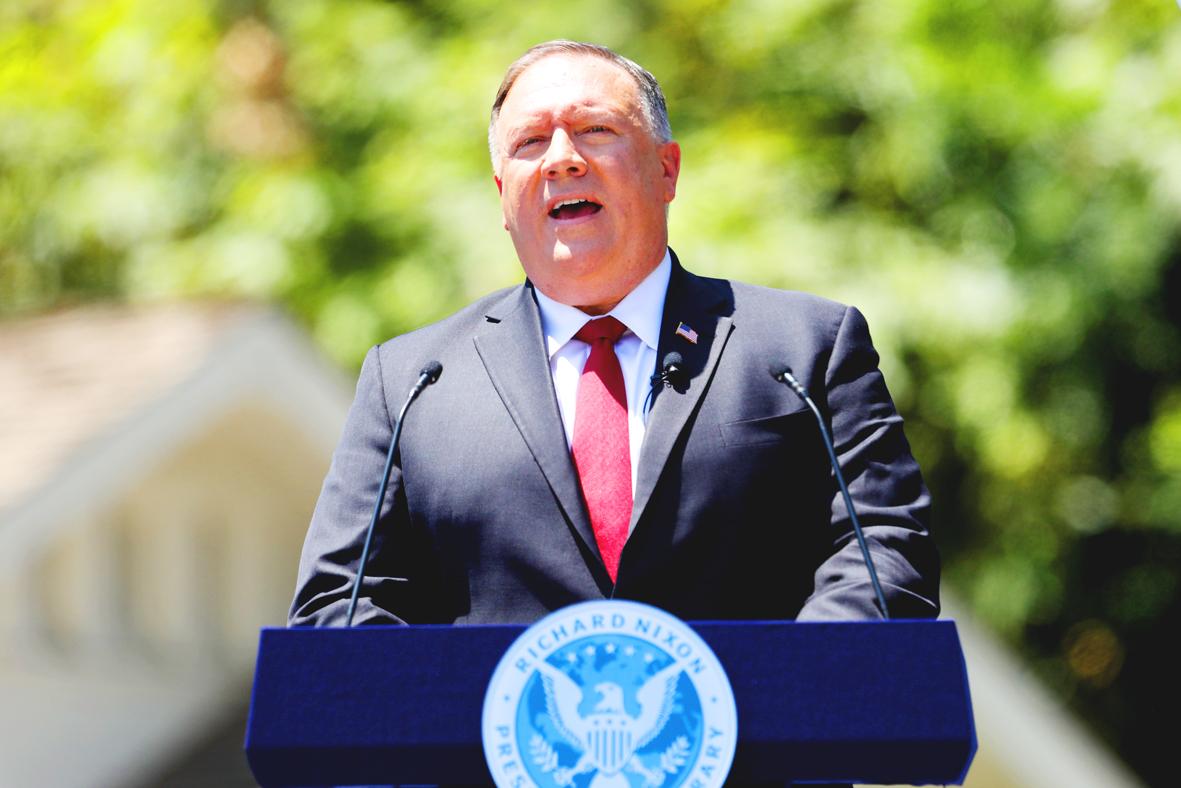The US Senate on Thursday passed its version of the US National Defense Authorization Act (NDAA) for next year, including provisions that support Taiwan’s participation in the Rim of the Pacific Exercise (RIMPAC), the world’s largest maritime warfare exercise, if appropriate.
The bill cleared the Senate floor in a 86-14 vote.
Provisions that include Taiwan are mentioned in sections 1258 and 1259 of the bill, which reiterates that the Taiwan Relations Act (TRA) and the “six assurances” provided by the US to Taiwan in July 1982 are “the foundation for United States-Taiwan relations.”

Photo: AFP / US NAVY / DYLAN M. KINEE
The “six assurances” were given by then-US president Ronald Reagan in 1982 and include pledges not to set a date for ending arms sales to Taiwan, not to hold prior consultations with China regarding arms sales to Taiwan, and not to be a mediator between Taiwan and China.
They also include assurances that the US will not revise the TRA or press Taiwan to enter into negotiations with China.
The NDAA also highlights US support for the development of Taiwan’s military, including through arms sales, exchanges between top defense officials and military exercises.

Photo: EPA-EFE
The exercises could include the RIMPAC, if appropriate, the NDAA says, although Taiwan has never participated before.
The NDAA also acknowledges China’s “increasingly coercive and aggressive behavior” toward Taiwan, contrary to the US’ expectation of a “peaceful resolution” of Taiwan’s future.
Citing the TRA, the NDAA says that the US would maintain the capacity “to resist any resort to force or other forms of coercion that would jeopardize the security, or the social or economic system, of the people on Taiwan, including the capacity of the United States armed forces to deny a ‘fait accompli’ operation by the People’s Republic of China to rapidly seize control of Taiwan.”
A section of the NDAA also advises the US Department of Defense to conduct port calls in Taiwan with two US naval hospital ships — the USNS Comfort and the USNS Mercy.
The port calls would allow “United States personnel to benefit from the expertise of Taiwanese personnel in light of the successful response of Taiwan to COVID-19” and would allow the two sides to continue collaborating on COVID-19 responses, the NDAA says.
The visits would also improve cooperation between the two sides in the areas of military medicine, humanitarian assistance and disaster relief, it said.
The US House of Representatives on July 21 passed its own version of the NDAA.
The two houses would soon begin negotiations to hammer out the differences in their competing bills before a final version can be signed into law by US President Donald Trump.
Separately on Thursday, US Secretary of State Mike Pompeo contrasted the responses of Taiwan and China to Washington’s policies.
“We opened our arms to Chinese citizens, only to see the Chinese Communist Party exploit our free and open society,” Pompeo said.
“We marginalized our friends in Taiwan, which later blossomed into a vigorous democracy,” he said.
Ministry of Foreign Affairs spokeswoman Joanne Ou (歐江安) yesterday thanked the US government for repeatedly voicing support for Taiwan publicly and urged other countries to face the threats posed by Beijing’s expansionism.
Whatever means China uses to squeeze Taiwan’s space in the global community, the government would never succumb to the pressure, Ou said in a statement, adding that the government would continue working with the US and other like-minded countries to defend democratic systems and a rule-based international order.
Ou also thanked the US Congress for continuing to promote Taiwan-US exchanges in military and security affairs.
The NDAA includes many provisions friendly to Taiwan, she said, adding that the ministry would monitor the bill’s development and maintain contact with US agencies to facilitate further Taiwan-US security cooperation.
Additional reporting by Lin Chia-nan

CHAOS: Iranians took to the streets playing celebratory music after reports of Khamenei’s death on Saturday, while mourners also gathered in Tehran yesterday Iranian Supreme Leader Ayatollah Ali Khamenei was killed in a major attack on Iran launched by Israel and the US, throwing the future of the Islamic republic into doubt and raising the risk of regional instability. Iranian state television and the state-run IRNA news agency announced the 86-year-old’s death early yesterday. US President Donald Trump said it gave Iranians their “greatest chance” to “take back” their country. The announcements came after a joint US and Israeli aerial bombardment that targeted Iranian military and governmental sites. Trump said the “heavy and pinpoint bombing” would continue through the week or as long

TRUST: The KMT said it respected the US’ timing and considerations, and hoped it would continue to honor its commitments to helping Taiwan bolster its defenses and deterrence US President Donald Trump is delaying a multibillion-dollar arms sale to Taiwan to ensure his visit to Beijing is successful, a New York Times report said. The weapons sales package has stalled in the US Department of State, the report said, citing US officials it did not identify. The White House has told agencies not to push forward ahead of Trump’s meeting with Chinese President Xi Jinping (習近平), it said. The two last month held a phone call to discuss trade and geopolitical flashpoints ahead of the summit. Xi raised the Taiwan issue and urged the US to handle arms sales to

BIG SPENDERS: Foreign investors bought the most Taiwan equities since 2005, signaling confidence that an AI boom would continue to benefit chipmakers Taiwan Semiconductor Manufacturing Co’s (TSMC, 台積電) market capitalization swelled to US$2 trillion for the first time following a 4.25 percent rally in its American depositary receipts (ADR) overnight, putting the world’s biggest contract chipmaker sixth on the list of the world’s biggest companies by market capitalization, just behind Amazon.com Inc. The site CompaniesMarketcap.com ranked TSMC ahead of Saudi Aramco and Meta Platforms Inc. The Taiwanese company’s ADRs on Tuesday surged to US$385.75 on the New York Stock Exchange, as strong demand for artificial intelligence (AI) applications led to chip supply constraints and boost revenue growth to record-breaking levels. Each TSMC ADR represents

Pro-democracy media tycoon Jimmy Lai’s (黎智英) fraud conviction and prison sentence were yesterday overturned by a Hong Kong court, in a surprise legal decision that comes soon after Lai was jailed for 20 years on a separate national security charge. Judges Jeremy Poon (潘兆初), Anthea Pang (彭寶琴) and Derek Pang (彭偉昌) said in the judgement that they allowed the appeal from Lai, and another defendant in the case, to proceed, as a lower court judge had “erred.” “The Court of Appeal gave them leave to appeal against their conviction, allowed their appeals, quashed the convictions and set aside the sentences,” the judges